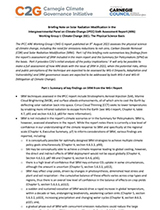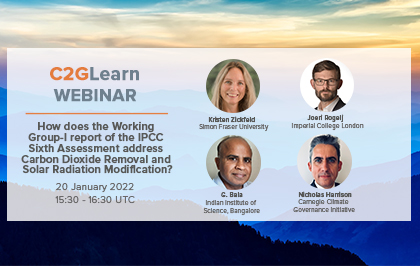Calls for an SRM ‘non-use agreement’ underline the need for governance

On January 17, more than 60 scientists and scholars launched a global initiative calling for a “non-use agreement on solar geoengineering”. This has prompted a vigorous debate within the academic community focused on these issues, and could have an impact on the evolution of a wider discussion in policy circles as well.
It is not C2G’s place to take a position on the initiative’s merits per se, but we do believe it underscores the challenge C2G was created to address: that potential climate-altering techniques are being considered increasingly seriously, and that this requires governance.
Governance is more than just creating rules: it involves a wide array of actors coming together to explore the challenges in many fora. By that measure, this latest initiative is a form of governance in itself, and in that sense, we welcome it.
What we would caution, based on C2G’s conversations with a wide range of governments and non-state actors, is that the world is not yet ready to draw conclusions about whether solar geoengineering – which we refer to as solar radiation modification (SRM), in line with the IPCC – should or should not be researched or ever be used, and what international processes may be needed or able to reach such conclusions.
The initiative correctly points out that SRM is risky and uncertain. At the same time, so is the context in which it might be deployed: that of a dangerously warming planet, where transformational emission reductions and carbon removal have not yet been delivered.
From current indications, the world is set to warm considerably more than the 1.5°C goal, and possibly well more than 2°C. This creates very large and uncertain risks – both known and unknown. It is far from clear whether current efforts to curb warming will be able to succeed, and there are limits to adaptation.
Because of these uncertainties, many suggest it would be both unscientific and unethical to exclude – without further exploration and debate – any potential options to reduce that risk and the potential suffering of current and future generations.
Our policy interlocutors tell us that they do not have enough information to take decisions about whether or not SRM may be needed. Neither have societal discussions and consultations taken place to support such decision making, or to address concerns around moral hazard. These positions may change in the future, but for now, their priority is to learn more.
It may be that at some point policy makers decide they do know enough to take steps like a non-use agreement, but they are not there yet. And to reach that point, many more discussions with a broader range of participants are needed.
Is SRM ungovernable?
The initiative invites signatories to an open letter, which states: “solar geoengineering deployment cannot be governed globally in a fair, inclusive, and effective manner.”
This is a strong assertion, and worth examining. There is little doubt that most SRM approaches would be extremely challenging to govern, given the operational requirements, the uncertainty and their potential for uneven consequences in an uneven world.
At the same time, a similar point might be made about many human processes, including any decision to effectively ban certain forms of action or the global governance related to climate action. And governance processes in a hotter world could also be less “fair, inclusive, and effective”.
Dealing in absolutes is challenging. In a world with no-risk free options, it may be more useful to compare relative risks. And this is true even for research on SRM. Which is more likely to lead to a “fair, inclusive and effective” outcome: a world with a broad-based, internationally governed research programme to explore the possibilities offered by SRM, or a world without one? Would an imperfectly internationally-governed SRM research programme create less risk than an imperfect ban?
These are some of the critical questions the world needs to address – and it will require more evidence, and substantially more inclusive international consultations, to do this.
Is there a moral hazard in exploring SRM?
The initiative’s open letter also states: “speculative hopes about the future availability of solar geoengineering technologies threaten commitments to mitigation and can disincentivize governments, businesses, and societies to do their utmost to achieve decarbonization or carbon neutrality as soon as possible.”
This is a critical concern, central to the arguments of many of those opposing further exploration of SRM. Certainly, solar radiation modification can never be a substitute for mitigation, as it does not directly address the source of climate change. And there are clearly vested interests looking for arguments to avoid the hard work of cutting emissions and removing carbon. Therefore, it is important to further explore governance approaches that reduce or eliminate the moral hazard. Some have argued that learning more about SRM could even spur the world to faster mitigation.
And let us not be under any illusions about the risks we are facing if we do not mitigate fast enough. In the IPCC’s latest AR6 report, even the most transformative action scenario shows a likely warming of 1.6°C by mid-century. Currently, even if all Glasgow pledges are fulfilled, we are still facing a temperature overshoot of approximately 2°C. In the more likely scenario of not all pledges being fulfilled, warming will be more: perhaps 3°C. This would be catastrophic for many ecosystems and large parts of humanity, especially the poorest and most vulnerable who are suffering first and worst from escalating climate impacts. And there are very real concerns that at some point, albeit still uncertain, an overshoot could set in train a series of irreversible processes that result in a ‘hothouse earth’, which would render many parts of the planet unlivable.
And finally, moral hazard can also go both ways. Overconfidence in the world’s ability to deliver rapid mitigation and adaptation could also lead to risky behaviour: such as the premature dismissal of potential additional approaches.
Finding effective solutions to these challenges will require broad-based governance approaches.
Creating inclusive governance around SRM
The initiative for a non-use agreement on solar geoengineering is one intervention in a debate that requires many more participants. There are many well-meaning experts who feel equally strongly that some of its calls could be profoundly damaging: such as ending public funding for research, and a ban on outdoor experiments. Inclusive governance is needed that provides for the fora and processes to learn, debate and eventually take decisions.
So how do policy makers navigate these competing narratives?
- First, let us be careful not to confuse issues around the research of SRM (and its governance), and around the potential deployment of SRM. While there are concerns that one might make the other more likely (the so-called ‘slippery slope’), it may make more sense to treat them separately. Experts, globally, need to continue to improve and share their understanding of the potential risks, benefits, and governance challenges and opportunities posed by SRM – and to do so in ways that recognise there are potential risks both in pursuing and not pursuing SRM. This may well require further research, including through collaborative international efforts.
- Second, the world needs to hear far more from the Global South. To date, the majority of arguments on both sides have been proposed by a relatively limited number of actors in the North. There is a danger in some voices pressing ahead with SRM research and development without sufficient consultation, but there is also a danger in some voices pressing ahead for a ban without sufficient consultation.
- And third, we need to bring a broader governance conversation into inclusive international fora, in ways that address or minimize the moral hazard. The fora that comes closest to offer the broad-based legitimacy needed for these conversations include the UN Environment Assembly and the UN General Assembly.
SRM governance is an area where reasonable minds can disagree. So let’s work it out as honestly and openly as possible, without pre-empting the ability of others to engage.
This is an area where limited interests on all sides, for a variety of reasons, can seek to sway decisions to their advantage. So let’s find processes which increase the chance of benefitting all people, including the vulnerable and less privileged.
The coming year or two will be critical to having and framing this debate. The good news is that, despite the challenges, most advocates and opponents of further SRM research are agreed on the need to prioritize mitigation, and to undertake a totality of climate action that benefits all people – even if they differ on the means to explore additional means to protect from temperature overshoot. So let’s keep the spirit of constructive discussion alive.
Related posts:
Refocusing C2G on catalysing the governance of Solar Radiation Modification
Blog by Janos Pasztor



0 Comments